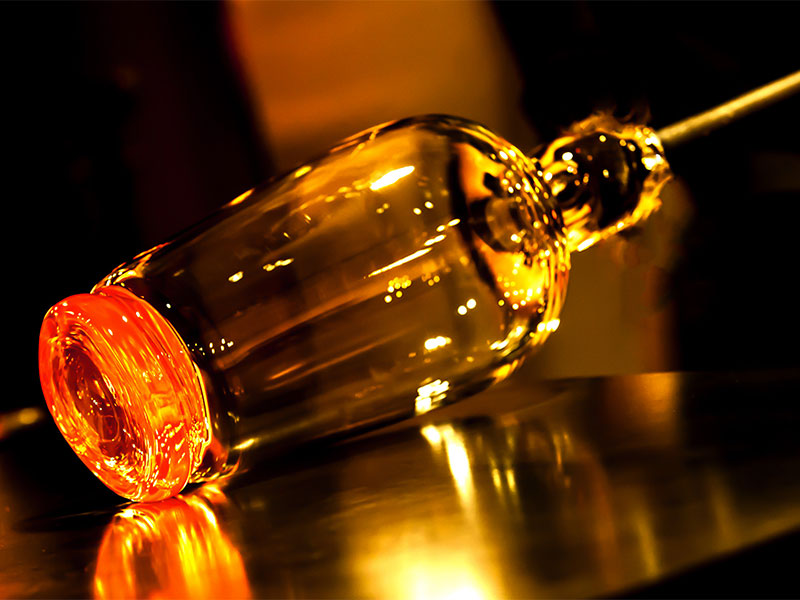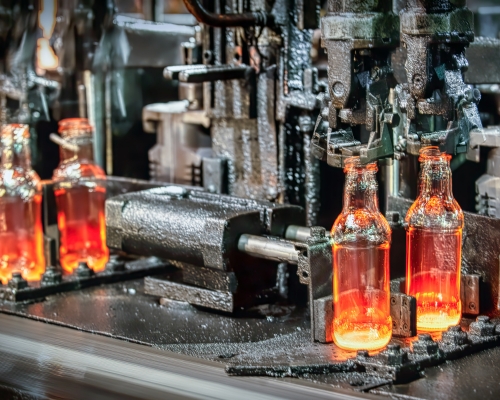Glass
Comprehensive Gas Solutions for the Glass Manufacturing Industry
With this rise in demand comes the need for improved productivity, efficiency, and quality control. To help glass manufacturers meet these growing needs, Oxynord provides tailored gas solutions that enhance every stage of the glass production process.
Oxynord’s extensive expertise in the glass industry allows it to support manufacturers with innovative solutions that optimize production, improve product quality, and ensure compliance with industry standards.

By delivering gases that are essential to various stages of glass manufacturing, Oxynord ensures that companies can maintain high levels of performance while meeting the evolving demands of the market.
Addressing the Challenges of Glass Manufacturing
Oxynord understands these challenges and works closely with glass manufacturers to provide the industrial gases that are critical for maintaining optimal production conditions. From melting to shaping and finishing, Oxynord’s gas solutions help manufacturers achieve higher efficiency while reducing their environmental impact.
Gases for Melting and Refining
One of the most critical stages in glass manufacturing is the melting process, where raw materials such as silica, soda ash, and limestone are heated to extremely high temperatures to form molten glass. This process requires precise temperature control and a stable atmosphere to ensure that the glass melts uniformly and remains free from impurities.
- Oxygen: Oxygen is used in oxy-fuel combustion to increase the efficiency of the melting process. By enriching the combustion air with oxygen, glass manufacturers can achieve higher temperatures with less fuel, reducing energy consumption and lowering greenhouse gas emissions. The use of oxygen in glass furnaces also helps minimize the formation of nitrogen oxides (NOx), improving the overall environmental performance of the facility.
- Hydrogen: Hydrogen is another key gas used in glass refining. It helps remove impurities and bubbles from the molten glass, ensuring that the final product is of high optical quality. The use of hydrogen in the refining process allows for smoother glass surfaces, which is especially important in the production of flat glass and optical glass.
- Nitrogen: Nitrogen is used to create an inert atmosphere in glass furnaces, preventing oxidation and other unwanted chemical reactions that can compromise the quality of the glass. Nitrogen is particularly useful in processes such as float glass production, where the atmosphere must be carefully controlled to ensure a flawless surface finish.
Gases for Forming and Shaping
Once the glass has been melted and refined, it is shaped into its final form. This stage requires precise control of temperature and pressure to ensure that the glass can be molded or blown into the desired shapes without defects. Oxynord provides gases that support forming and shaping processes, allowing manufacturers to produce a wide range of glass products, from flat glass to intricate glassware.
- Argon: Argon is often used in glassblowing and other forming processes to create a protective atmosphere that prevents the glass from reacting with the surrounding air. This helps maintain the clarity and strength of the glass while allowing for greater precision in shaping.
- Helium: In certain applications, helium is used to cool glass rapidly during forming, helping manufacturers achieve faster production cycles without compromising the quality of the glass. Helium’s unique properties make it an ideal choice for high-speed production environments.
Gases for Finishing and Annealing
The annealing process is critical for ensuring the durability and safety of glass products. During this stage, the glass is slowly cooled to relieve internal stresses that could otherwise lead to cracking or breaking. Oxynord supplies gases that assist in the annealing process, ensuring that the glass is properly tempered and ready for use in a variety of applications.
- Carbon Dioxide: Carbon dioxide is used in annealing lehrs to control the atmosphere and temperature during the cooling process. By creating a stable atmosphere, carbon dioxide ensures that the glass cools evenly, preventing defects and improving its mechanical properties.
- Nitrogen: Nitrogen is also used in the finishing process to create an inert atmosphere that prevents oxidation and other chemical reactions during cooling. This is especially important for specialty glass products that require high levels of clarity and strength.
Improving Productivity and Reducing Environmental Impact
Oxynord is committed to helping glass manufacturers improve productivity while also reducing their environmental footprint. By supplying gases that optimize the efficiency of glass furnaces and reduce emissions, Oxynord enables manufacturers to meet both production and sustainability goals.
- Energy Efficiency: Oxynord’s gas solutions, such as oxygen-enriched combustion, help reduce fuel consumption in glass furnaces, making production more energy-efficient. This not only lowers operating costs but also helps manufacturers comply with environmental regulations aimed at reducing greenhouse gas emissions.
- Sustainability: With growing pressure to reduce the environmental impact of industrial processes, Oxynord works with glass manufacturers to implement cleaner technologies that minimize emissions of pollutants such as NOx and CO2. By using oxygen and other gases to improve combustion efficiency, manufacturers can reduce their reliance on fossil fuels and lower their overall carbon footprint.
Tailored Solutions for Glass Manufacturers
Oxynord understands that every glass manufacturing facility has unique needs, depending on the types of products they produce and the technologies they use. That’s why Oxynord offers customized gas solutions that are tailored to the specific requirements of each manufacturer.
Whether it’s supplying oxygen for high-efficiency melting or providing nitrogen for precise atmosphere control, Oxynord’s team of experts works closely with customers to develop solutions that enhance productivity, improve product quality, and ensure compliance with environmental regulations.

Why Choose Oxynord for Glass Manufacturing Solutions
Oxynord provides customized gas solutions specifically designed to meet the unique needs of glass manufacturers. Here’s why Oxynord is the preferred partner:
- Tailored Gas Solutions: Oxynord offers oxygen for high-efficiency melting and nitrogen for atmosphere control, adapting to the specific requirements of each facility to optimize production.
- Expert Collaboration: Oxynord’s team works closely with manufacturers to develop solutions that enhance productivity and improve product quality.
- Regulatory Compliance: Oxynord ensures all solutions meet environmental regulations, helping glass manufacturers operate sustainably and efficiently.
